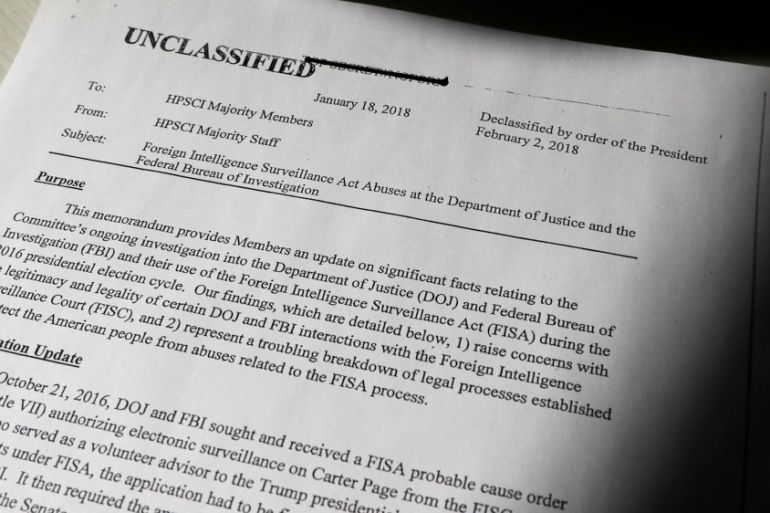‘Memogate’ and Trump’s dangerous paranoia
The infamous Nunes memo has likely fed Trump’s paranoia about US law enforcement and intelligence agencies.

Washington, DC, is a city of memos. The entire town runs on memos produced by the massive US government bureaucracy on everything from internal reforms at the State Department to debates about personnel in the White House. Indeed, this is how the sausage is made; without the paper pushers on both ends of Pennsylvania Avenue, Washington would cease to function.
Yet over the last week, one memo, in particular, has hovered over the town like a giant, black storm cloud: the Nunes memo. It is a four-page document written by Intelligence Committee Chairman Devin Nunes’ staff that alleges FBI and Justice Department abuse of surveillance laws in order to monitor a man named Carter Page, a former foreign policy adviser to then-candidate Donald Trump’s presidential campaign.
Keep reading
list of 4 itemsSix takeaways from first day of Trump’s New York hush money criminal trial
Day 1 of Donald Trump’s first criminal trial
What is Donald Trump’s ‘hush money’ trial all about?
Democrats have blasted its contents as inaccurate, misleading, and spurious, manufactured by Republican partisans to protect President Trump and discredit Special Counsel Robert Mueller’s Russia investigation. Not so, say Trump’s allies on Capitol Hill; the memo is all about exposing the length to which the nation’s law enforcement agencies went to spy on an American citizen based on politically-biased information.
Whatever the memo’s actual motive, President Trump has embraced it as confirmation that the “deep state” was out to get him all along. “This memo totally vindicates ‘Trump’ in [the Russia] probe,” Trump tweeted last weekend. “But the Russian Witch Hunt goes on and on.”
Amid all the partisan name calling about whether the Nunes memo proves anything at all, Trump’s state of mind is the real story. His intense paranoia has now been fed, and the war between the Commander-in-Chief and the law enforcement agencies he leads may get even bloodier.
It’s not a stretch to label Donald Trump as the most conspiratorial individual occupying the Oval Office since President Richard Nixon. This is not a partisan statement, for Trump has exposed himself through word and deed to be a man constantly on guard for the most minor affront.
If Nixon was the president most famous for letting his political enemies get the better of him, Trump is Nixon on steroids.
All presidents, Republican and Democrat, expect and are indeed entitled to a certain amount of loyalty from their staffers and cabinet officers.
Trump, however, is different. He demands full, complete, and unfettered loyalty to Trump, the brand, and to Trump, the person, even if it may cross legal or ethical lines. No department head is immune to Trump’s wrath; when Attorney General Jeff Sessions recused himself from the Russia investigation, Trump insulted him to his face and humiliated him in public.
When Secretary of State Rex Tillerson implied that the US was open to a discussion with Kim Jong-un about North Korea’s nuclear weapons programme, Trump undercut his top diplomat at the knees to remind him about who was calling the shots. And when congressional Democrats chose to stay in their seats for much of the State of the Union address last week rather than participate in numerous standing ovations, the president called it unpatriotic to the point of treason.
America’s institutions do not skate free either. When the press writes critical stories about him or scrutinises his accomplishments, Trump indicts the media as “the enemy of the American people.” When stories about the inner workings of the administration are revealed in a less than flattering light, the president exploits his Twitter cudgel and blames the FBI for failing to stop the leaks. His administration, in other words, is not the problem – the system is.
This is a man, after all, who appears to genuinely believe that the Mueller investigation is a political hit job created by his opponents to delegitimise his presidency after losing an election. This is a man who, before he was even inaugurated, equated the US intelligence community to Nazi Germany for seemingly allowing anonymous sources to talk to the press about the infamous Steele dossier. And this is a man who accused his predecessor of using the awesome powers of the presidency to wiretap his phones in Trump Tower during the 2016 campaign.
If Nixon was the president most famous for letting his political enemies get the better of him. Trump is Nixon on steroids. It’s not just Democratic politicians and a left-leaning mainstream media under the microscope, but district court judges, circuit court judges, US intelligence agencies, government bureaucrats, the Justice Department, the State Department, and his own political appointees. No one is off limits. Everybody is a target.
The Nunes memo may be forgotten or dismissed as irrelevant in a few weeks time. Other developments in the Russia investigation will overshadow it. But for Donald Trump, the memo will be an affirmation of what he has already convinced himself: Some of most cherished US institutions are engaged in a conspiracy to bring him down and ruin his presidency.
This will get a lot worse before it gets better.
The views expressed in this article are the author’s own and do not necessarily reflect Al Jazeera’s editorial stance.
